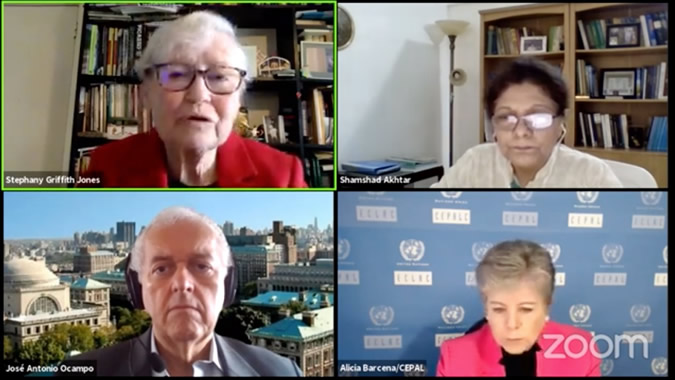It is Time for Middle-Income Countries to Be Part of Debt Relief Initiatives for a Green and Inclusive Recovery: Alicia Bárcena
ECLAC’s Executive Secretary participated in an international conference organized by the Heinrich Böll Stiftung, the Centre for Sustainable Finance at SOAS University of London, and the Boston University Global Development Policy Center.

It is time for middle-income countries to be made part of debt relief initiatives for a green and inclusive recovery, Alicia Bárcena, Executive Secretary of the Economic Commission for Latin America and the Caribbean (ECLAC), said today during an international conference entitled Debt Relief for a Green and Inclusive Recovery, organized by the Heinrich Böll Stiftung, the Centre for Sustainable Finance at SOAS University of London, and the Boston University Global Development Policy Center.
“We aspire to a new global multilateral mechanism for restructuring debt. We need to build a new architecture at an intergovernmental level, which would include a public rating agency. We have to completely rethink the debt restructuring mechanism,” sustained Bárcena, who was one of the keynote speakers at this virtual event where the document Debt Relief for a Green & Inclusive Recovery: Securing Private Sector Participation and Policy Space for Sustainable Development was unveiled.
In her remarks, ECLAC’s highest authority called attention to the urgent need to close asymmetries globally, both health asymmetries (related to access to vaccines) as well as those associated with climate change and access to financing.
Bárcena noted that the document presented by the three organizing institutions “makes a very useful and innovative” contribution to the discussion about the debt problem in developing countries, which has been aggravated by the COVID-19 crisis, and that “it is aligned with the 2030 Agenda for Sustainable Development, with the Paris Agreement on climate change and with ECLAC’s views.”
“We are pleased that the document includes the Debt-for-Climate-Adaptation Swap Initiative and the Caribbean Resilience Fund proposed by ECLAC,” the senior UN official stated. “We are moving forward on case studies in countries such as Antigua and Barbuda, Saint Lucia and Saint Vincent and the Grenadines that may be very useful for future work in this area.”
Latin America and the Caribbean is the most indebted region in the developing world: the central government’s total debt is equivalent to 79% of GDP and its total external debt is 56% of GDP, Bárcena indicated.
The region also has the highest ratio of external debt service to exports of goods and services (59% of GDP), she recalled. This especially affects small economies of the Caribbean, where the tourism sector has collapsed due to the COVID-19 pandemic, she explained.
The lack of international cooperation during the crisis, especially for middle-income countries, is one of the reasons why debt levels have increased considerably, ECLAC’s Executive Secretary added.
Middle-income countries represent 75% of the global population, 30% of aggregate demand in the world and 96% of the debt of developing countries, excluding China and India, she specified.
Nonetheless, based on their per capita GDP, the majority of these countries are excluded from initiatives for debt relief and increased liquidity. “This ignores the fact that middle-income countries are characterized by having high levels of inequality and sharing vulnerabilities with low-income countries,” she emphasized.
To date, only four countries in Latin America and the Caribbean (Dominica, Grenada, Saint Lucia and Saint Vincent and the Grenadines – all of them in the Caribbean) are participating in the Debt Service Suspension Initiative (DSSI), she revealed.
“We need a redistribution of liquidity from developed countries to developing countries. This is not just about expansion, but also redistribution,” she stated.
Bárcena also warned about the increase in debt levels seen among both public and private companies in the productive sector.
In this context, she said, ECLAC has proposed that all highly indebted economies should benefit from debt relief or standstills, and that those economies facing short-term debt profiles or a high debt service burden should also be entitled to some type of debt relief, including the Small Island Developing States (SIDS) of the Caribbean and Central American countries.
“Any successful debt relief or restructuring initiative requires changes in the international debt architecture. It is also necessary for there to be obligations for private creditors. Financial stability is a global public good,” she insisted.
Finally, Bárcena indicated that in order to truly make progress on a green and inclusive recovery, it is necessary to promote sectors and projects that are environmentally sustainable, and that also generate a significant number of quality jobs. ECLAC has calculated, for example, that if Latin America and the Caribbean moves towards renewable energies, it can reduce its CO2 emissions by 30% and create around 7 million more jobs, she said.
Participating in the event were Shamshad Akhtar, Chairperson of the Board of Pakistan Stock Exchange and Chair of the Board of Directors of Karandaaz Pakistan; Kevin P. Gallagher, Director of the Global Development Policy Center at Boston University; Stephany Griffith Jones, Financial Markets Program Director at Columbia University’s Initiative for Policy Dialogue; Moritz Kraemer, Chief Economist at CountryRisk.io and Senior Fellow at SOAS University of London; and Ulrich Volz, Director of the Centre for Sustainable Finance at SOAS University of London.
In addition to Alicia Bárcena, the keynote speakers were Louis Kasekende, Executive Director of Macroeconomic and Financial Management Institute of Eastern and Southern Africa, and José Antonio Ocampo, a Columbia University Professor.
Contact
Public Information Unit
- prensa@cepal.org
- (56 2) 2210 2040